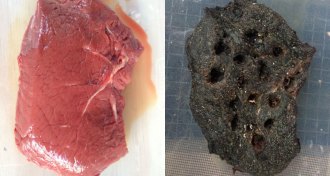Uncategorized
-
 Agriculture
AgricultureA new way to genetically tweak photosynthesis boosts plant growth
A new chemical road map for a process called photorespiration in plant cells could reduce energy waste to increase plant productivity.
-
 Planetary Science
Planetary ScienceChina just landed the first spacecraft on the moon’s farside
China’s Chang’e-4 lander and rover just became the first spacecraft to land on the farside of the moon.
-
 Planetary Science
Planetary ScienceNew Horizons shows Ultima Thule looks like a snowman, or maybe BB-8
Ultima Thule’s snowmanlike shape shows the New Horizons target was probably two space rocks that got stuck together.
-
 Health & Medicine
Health & MedicineA new implant uses light to control overactive bladders
Experiments in rats show that a new soft device could help alleviate frequent, sudden urges to urinate.
-
 Anthropology
AnthropologyThis scientist watches meat rot to decipher the Neandertal diet
This scientist is studying how meat changes as it rots to figure out what Neandertals might have eaten.
-
 Astronomy
AstronomyKnown as the ‘mother of Hubble,’ astronomer Nancy Roman dies at 93
Astronomer Nancy Roman, the “mother of Hubble,” has died.
-
 Animals
AnimalsMacaques take turns while chattering
Japanese monkeys take turns while communicating. Adjusting response times while chattering, macaques intentionally pause like humans do when chatting.
By Katie Brown -
 Planetary Science
Planetary ScienceLive updates: New Horizons’ flyby of a distant Kuiper Belt object
The New Horizons spacecraft is ready for the most distant close flyby of a rocky object in the solar system, a rocky body called MU69 or Ultima Thule.
-
 Astronomy
AstronomyThese are the most-read Science News stories of 2018
From male birth control to wombat poop, Science News online readers had a wide variety of favorite stories on our website.
-
 Science & Society
Science & SocietyWhat will be the big science stories of 2019? Here are our predictions
From black hole insights to the future of self-driving cars to figuring out what it means to be human, 2019 will be a big year in science.
By Kate Travis -
 Artificial Intelligence
Artificial IntelligenceArtificial intelligence is mastering a wider variety of jobs than ever before
In 2018, AI bested humans at following fauna, diagnosing disease, mapping the moon and more.
-
 Astronomy
Astronomy50 years ago, astronauts orbited the moon for the first time
Apollo 8 launched on December 21, 1968, with three astronauts on board, making 10 revolutions around the moon — the first manned lunar orbits.